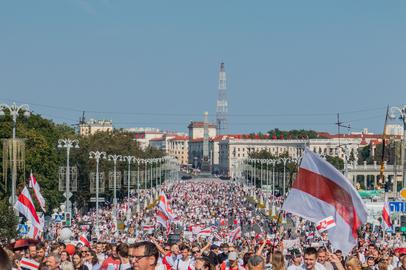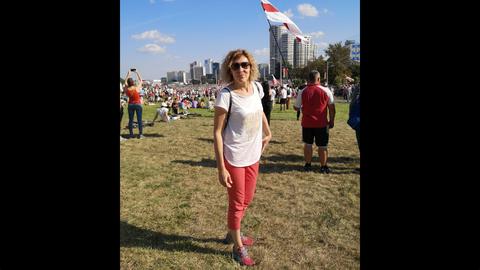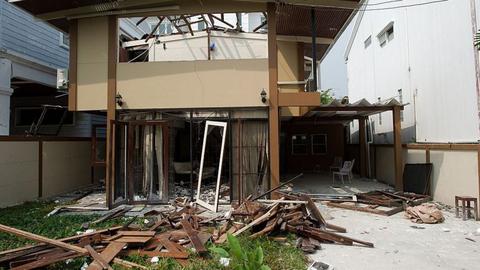Emil Filtenborg and Stefan Weichert are independent journalists based in Ukraine. In a weekly series for IranWire, they examine the landscape of disinformation in Russia and some of the false information that has emanated from the country since the outbreak of coronavirus.
The protests in Belarus are continuing. The fight is not only on the streets but also online – as the Belarusian authorities targets reporters and Russia tries to spin the demonstrations as being dangerous and controlled by the West.
According to the country’s opposition, more than 30,000 people in Belarus have been arrested since anti-government protests broke out against President Alexander Lukashenko in August after the disputed presidential election. The demonstrations escalated after Lukashenko claimed victory. Reporters were among those arrested and many have been forced to leave Belarus for their safety.
Inside Belarus, Russian state journalists replaced several Belarussian state journalists who left their jobs due to the government's violent crackdown on protestors. Russia has since continued to try to influence the narrative about Belarus’s ongoing protests both for domestic and international audiences. Now the violence and threats against those challenging the Russian-Belarusian narrative is reaching critical levels.
In recent weeks, Sputnik has published stories blaming the West for the protests. An article quoting Russian Foreign Minister Sergei Lavrov says that money and instructions on “how to make incendiary mixtures and explosives, such as Molotov cocktails and many others” have been found coming from the West. The claims have not been backed by evidence or critical examination by Sputnik and they are in sharp contrast to other reports.
Opposition leader Sviatlana Tsikhanouskaya, who fled to Lithuania for her safety, has tried to establish a fund supporting Belarus’s striking workers. But there is no proof that she has tried to bankroll violence.
But there is much evidence that the government has used excessive violence against protestors – such as beatings, torture, and psychological pressure – as found by Human Rights Watch and others. Sputnik in its reports has not mentioned these charges. Nor have the reports mentioned the peaceful nature of the protests – and this is not even the only example of bias among Russian media outlets on the Belarusian unrest.
In another article, Sputnik tries to cast the opposition in a bad light with an interview with Kayla Popuchet, who minored in Slavic studies at the City University of New York. In the interview, Popuchet claims that Tsikhanouskaya is backed by the same forces that tried to bring down the Soviet Union and tries to insinuate that the protest organizers use their red and white Pahonia flag because of secret Nazi sympathies.
But there have been no reports about Nazi sentiments among the opposition or pictures of Nazi salutes among protestors. Tsikhanouskaya has also repeatedly said that the opposition is not a Western-led movement, nor is it an anti-Russian movement, even as it has expressed concern over the Russia’s support for Lukashenko. While there are many critical questions to ask Popuchet, Sputnik refrains from doing so.
Trying to Shape People's View
While Popuchet claims that Western coverage is one-sided, IranWire has previously written about how Belarusian and Russian media target protestors with lies and half-truths, trying to demonize them by associating them with the West. Western reporters have covered pro-government rallies in Belarus, Popuchet’s, though less than anti-government protests; perhaps, though, this is because pro-government rallies are small and because many reporters have been denied press accreditation making it impossible to cover the rallies without being arrested.
Inga Khrushcheva is a journalist and activist who has reported from the protests while collecting signatures for the Belarusian presidential candidate Viktor Babariko. Khrushcheva, who left Belarus in September after being told that the government was investigating her, does not deny that she wants a change of government. But she told IranWire that she is surprised by the lack of fairness from both Russian and Belarusian state media.
“The main angle of many pro-government media reporting on events in Minsk and other Belarusian cities is Russia’s possible ‘loss' of a ‘brotherly Slavic’ country. Everything else – decades of harsh dictatorship and repression, rigged elections, the human rights of Belarusians, mass beatings, torturing and imprisoning of protesters – elicits no comparable response as reflections on whether Russia will ‘lose’ Belarus or maintain it in its geopolitical orbit, preferably also under its military control,” Khrushcheva said.
She added that Belarusian has hardly reported on the support for Babariko; and that she herself has seen the signatures for his candidacy. Khrushcheva added that she has spent much time in demonstrations since August 9, where she has seen people protest voluntarily and not because somebody paid them, as claimed by Belarusian state media.
“The authorities declare that there was no torture or violence. But on my Facebook page, I posted the video testimony of my friend, who survived torture in Okrestino [prison]. And there are many such testimonies,” Khrushcheva said.
Khrushcheva said she has seen how the Russian state channel RT has lied about the size of the protests and about other points. One RT correspondent claimed that only around 20,000 people were participating in a massive opposition demonstration, on August 23, while the BBC, among others, estimated the real number to be ten times higher. In the same way, she says that Russian media recently have started to speculate on why the protests broke out in the first place.
One example of this was seen on the Russian site South Front. In a recent article, the site speculated that the killing of 31-year-old protestor Roman Bondarenko in Minsk could be “some sort of ‘sacred sacrifice’ to provide an impetus for the protests and riots against President Alexander Lukashenko” without giving any sources or evidence. The report was in sharp contrast to how the events have been reported by Western media outlets such as The Guardian.
visit the accountability section
In this section of Iran Wire, you can contact the officials and launch your campaign for various problems


























comments